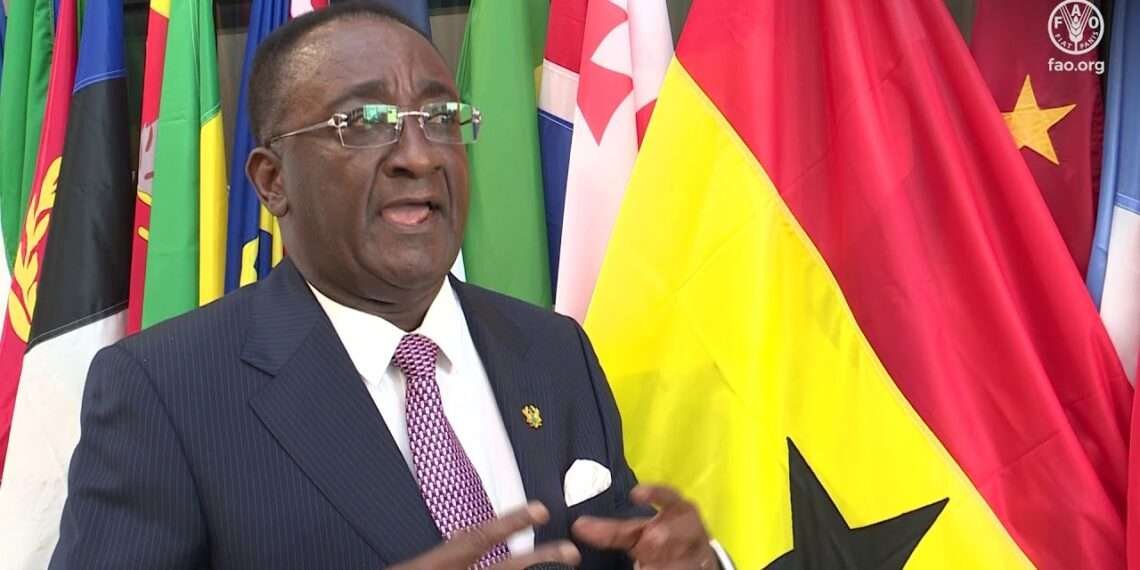The Minister of Food And Agriculture, Dr. Akoto Afriyie, has disclosed that forty percent of Ghana’s food is lost annually due to climate change effects.
The continuous use of resources such as land, water and many more to meet the country’s growing demands for food has led to the exploitation of these national resources; leading to land degradation and biodiversity loss resulting in low productivity, he said. Ghanaian farmers lose almost 40 percent of their produce to climate change effects.
Accelerating Impacts of CGIAR Climate Research for Africa (AICCRA) has launched climate-smart innovations for healthier crops, animals, and people in partnership with the World Bank. The Minister, speaking at the AICCRA forum, said Ghanaian farmers are already experiencing climate shocks and losing chunk of their produce to extreme weather conditions such as drought and flooding.
“I support AICCRA’s climate-smart agriculture project. I hope that this project will help the agri-food systems to be resilient to some climate shocks. Severe drought and extreme temperature increases have been on the rise in Africa. About 40% of food is lost annually to climate change effects. Ghanaian farmers are already experiencing climate shocks. Cocoa is expected to experience a loss of 3% in the short term by 2025. Indeed, agriculture remains central to the livelihood of many Africans. Upper East and West have 84 percent of households dominated by agriculture, and these regions are hard-pressed with climate-related issues. There is a high rate of return to agriculture investments. I urge everyone to support this project to make agriculture in Ghana resilient.”
Dr. Akoto Afriyie
The year 2022 has been designated the year of nutrition for Africa by the African Union and African Heads of State to address the daunting food security challenges on the continent. To this effect, the World Bank, in partnership with AICCRA, has launched the project to oversee and manage climate-related challenges which stand a chance of propelling the food security problems in Africa.
Speaking at the launch, Michael Morris, Lead Agriculture Economist from the World Bank said that climate change had affected the African continent as far back as 1961, causing droughts and increased diseases and pest infestations on the continent. “Climate change stands as the single greatest threat to Africa’s food systems. Hence, the World Bank does everything now through the lens of climate change and has devoted 35% of its funding to the development of climate resilience innovations,” he added.

To include women in the AICCRA climate-smart innovation project, Marie Ena Derenoncourt, a Gender Smart Investment Specialist emphasized the gender gap in Ghana and suggested the way forward to include women in the project. She disclosed that women should be given access to credit to be the agent of change in the agri-food systems. “Gender segregated data should be collected and analyzed to monitor the role and progress of women in the AICCRA project,” she noted.
Some participants at the launch suggested that AICCRA should focus more on using Integrated Pest management practices than using the pesticides seen on the Ghanaian market.
To this effect, the AICCRA Ghana lead, Ghislain Teppa-Yota, said the project would focus on minimizing pest and diseases infestation while building the capacity of farmers in climate-smart resilience innovation practices. He reassured all to use data to make informed decisions to push the climate-smart IPM strategy in AICCRA’s operational areas.
AICCRA components and operational Areas
Accelerating Impacts of CGIAR Climate Research for Africa (AICCRA) helps deliver a climate-smart African future driven by science and innovation in agriculture. The AICCRA project has three components: the development of climate-informed agricultural advisory services and decision-making tools; strengthening partnerships for the delivery of climate-smart innovations in agriculture; and validating climate-smart innovations through piloting. The AICCRA aims to support programs in three agro-ecological zones in Africa, namely the Western Africa and Sahelian dryland, the Eastern Africa dry lowlands to highlands, and the Southern Africa drylands which are among the most vulnerable in the world to impacts of climate change. AICCRA’s operational areas is in 6 African countries, including Ghana, Mali, Senegal, Kenya, Ethiopia, and Zambia.
READ ALSO: GNPC Failing ‘Miserably’ at its Core Mandate- Mad. Elizabeth Vaah




















